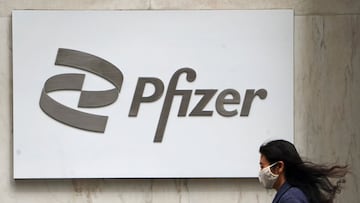Coronavirus US: is Pfizer's pill authorized by the FDA?
Pfizer has submitted the results of its clinical trial for a new medication to treat covid-19 to the FDA, when will it be approved for emergency use?

Pfizer announced this week that it submitted clinical trials for a new medication that could help limit hospitalizations and deaths from covid-19 by eighty-nine percent called PAXLOVID™. Overall more than 1,200 people participated in the trial and of those who received the drug, no deaths were reported, “compared to 10 deaths in patients who received placebo.”
The trial included participants from "North and South America, Europe, Africa, and Asia, with 45% of patients located in the United States."
Pfizer Chairman and Chief Executive Officer Albert Bourla described the news as "a real game-changer in the global efforts to halt the devastation of this pandemic." Adding that the drug "has the potential to save patients’ lives, reduce the severity of COVID-19 infections, and eliminate up to nine out of ten hospitalizations." The trials also found the drug to be effective in patients up to five days after covid-19 symptoms began.
Big and very positive news today on Pfizer's anti-Covid pill --Paxlovid --that reduced hospitalization and death by 89%, taken within 3 days of diagnosis👍https://t.co/vrCtG2Dx6L @JaredSHopkins
— Eric Topol (@EricTopol) November 5, 2021
This week's @ScienceMagazine paper below on the 2nd such pill https://t.co/8GRiAb2zi6 pic.twitter.com/eLeRzbWEMK
In the coming weeks, the Food and Drug Administration will review the documentation to evaluate the findings. The FDA could give the drug Emergency Use Authorization meaning doctors could begin prescription the drug very soon.
Global rollout of the medication
At this point, many public health experts describe the state of the pandemic as a race between vaccines and the variants. As the Delta variant showed us, the pandemic is far from over so long as large amounts of the population remain unvaccinated.
When making the announcement, Pfizer said it will remain laser-focused on equity and ensuring that Pfizer fulfills its "responsibility to help healthcare systems and institutions around the world while ensuring equitable and broad access to people everywhere.”
Read the new @IDS_UK blog by Anabel Marin: The market configuration failure behind Covid vaccine supply.
— Institute of Development Studies (@IDS_UK) October 28, 2021
Read at: ➡️ https://t.co/Vd1z4XRhzO#Covid-19 #Vaccines pic.twitter.com/okNsqPkcWz
Related stories
However, thus the issue of equitable access to vaccines has been regarded as a "moral failure," and only time will tell if treatments for covid-19 will meet the same fate. High-income countries have been able to vaccinate around 61 percent of their population, and millions have begun to receive a third "booster shot." Meanwhile,low-income countries have around 2.15 percent of their population fully vaccinated, and the World Health Organization has argued that this is because of "insufficient and unpredictable supply."
Pfizer has yet to donate any vaccine doses to COVAX, the global distribution program, directly. Earlier this year, the company opted to sell around 200 million doses of the vaccine to the US government at a "not-for-profit" rate. POLITICO has reported that the company is expected to make around $10 billion in profits this year from covid-19 vaccines. The ethics of global vaccine rollout are sure to be a topic of conversation as this crisis continues, reaching disproportionate pain in low-income countries that could become the next hot spot as mutations emerge.

